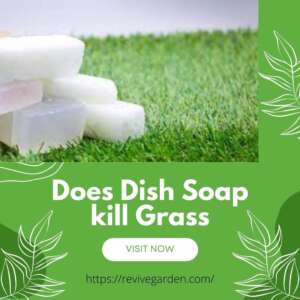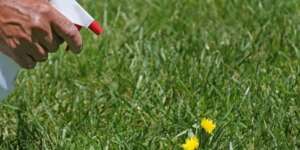Table of Contents
 One of the most difficult things to do outside is to have a nice, beautiful lawn. If you have a problem with your grass, you may ask yourself, does dish soap kill grass?
One of the most difficult things to do outside is to have a nice, beautiful lawn. If you have a problem with your grass, you may ask yourself, does dish soap kill grass?
Dish soap is used for dishes, and it works fine. So can we use it on my grass to get rid of the weeds? None of us wants to weed eat every week or two. Some herbicides work pretty well, but they aren’t cheap. In this article, we will explain whether dish soaps kill grass and weeds or not?
You may have seen a lot of threads on the net about using dish soap to kill the grass. Dish soap contains chemicals that can help you kill off unwanted grass and weeds in your yard. Dish soap isn’t always the best option, but if you know what you are doing, you can use dish soap to kill almost any kind of plant.
Does Dish Soap Kill Grass – Find A Quick Way
Dish soap is a great way to clean up your dishes and your hands, but it can also be used to kill the grass. While this might sound like counterintuitive advice, dish soap can be a great way to kill the weeds growing on your lawn.
The chemicals in dish soap damage the soil’s ability to absorb water. The liquid also dissolves the protective cuticle on the leaves of plants, making them more susceptible to disease and insect infestations.
Diluted Dish Wash
To avoid harming your lawn, choose a soap specifically formulated for washing greasy dishes or pots and pans. Dish soaps may contain phosphates or other chemicals that harm plants, but commercial dish soaps are designed to be less damaging than household detergents.
The dish soap you are using is very diluted. When diluted, dish soap does not have the same harsh chemicals as the full-strength product. However, it still contains surfactants, disrupting the plant’s surface chemistry and causing harm. Diluted dish soap can also damage plant roots if sprayed directly on them.
Diluted dish soap contains chemicals that can kill the grass. When the soap solution reaches the plant’s leaves, it dissolves the plant’s protective cells. This process can damage the plant’s roots and leaves.
How Dish Soap Kills Grass
Dish soap works by breaking down the cell walls of plants. When you spray the dish soap onto the grass, it will break down the cell walls, causing them to die and turn brown. This works so well when trying to kill weeds because dish soap is made with sodium Laureth sulfate (SLES), an organic compound that breaks down cell walls.
Method of Preparation
If you want to kill all of the grass in your yard with dish soap, you should use 1/4 cup of Dawn dish soap for every gallon of water you spray on the ground. If there are only one or two patches of weeds that need killing off, it will be easier to use a spray bottle with some water mixed in with the dish soap.
Pros and Cons
Dish soap can kill grass if it’s used regularly. The active ingredients in dish soap can strip the protective outer layer of the soil and plant’s roots, causing them to die. Additionally, dish soap can corrode metal surfaces, damaging plants.
Pros
- Can use dish wash to clean leaves and grass.
- Dish soap can also be used as a pesticide.
- It affects soil,
- It is not a much more expensive and easy method for killing grass.
- You can use dish soap to kill small patches of grass without having to buy any chemicals or hire a professional landscaper.
- The soap acts as a repellent and prevents new growth from taking root in your lawn.
- It does not kill the roots.
- It simply prevents them from growing back after being removed by hand or mower.
Cons
- It will take many attempts to kill all of the grass.
- There is a high risk that you will kill some of your other plants.
- As long as there is still moisture in the ground, new shoots will continue to grow even after multiple applications of dish soap over several days or weeks have passed.
- It may take several applications to kill all grass, especially if it’s already well-established.
- Dish soap has a very high pH level. It is unsuitable for most plants and lawns because it can burn their roots or leaves. They come into contact with it while watering them or handling them manually during maintenance activities such as pruning.
- Even if you don’t apply a dish soap directly onto your turfgrass or plants, runoff from rainstorms can carry the chemical down into their root systems, where it will cause damage.
Sodium Lauryl
Dish soap contains sodium lauryl sulfate . This chemical is responsible for the foamy bubbles in your dishwater. Sodium lauryl sulfate can harm plants and animals, so you need to be careful when using it around your garden or pets.
Sodium Lauryl Sulphate
Sodium lauryl sulfate is an alkaline detergent that contains sodium ions and lauryl sulfate ions. You may find it in many cleaning products, including toothpaste and shampoo. It acts as an emulsifying agent that helps other chemicals mix with water, which is useful in making suds.
Dish Soap Danger to Plants

Dish soap can damage the leaves of certain plants when they come into contact with the chemical. If you spray your vegetable garden with dish soap, you may notice leaf damage within a few days or weeks of application. The same goes for any other type of plant life that grows in your yard or garden area.
Alternate for insecticidal soaps
Insecticidal soap is a great product that kills insects on contact. The active ingredient in insecticidal soap is potassium salts of fatty acids, which act as a contact poison to insects and mites. The soap breaks down the protective layer on the insects’ surface, causing them to dehydrate and either die quickly or depart from treated plants. Insecticidal soaps are considered safe for people and pets, but you should not use them in food gardens or around edible crops. In addition to killing pests, insecticidal soaps can also kill beneficial insects such as ladybugs and lacewings.
Not Possible to Swipe
While it may not be possible to replace insecticidal soap with another product, there are some options available if you want to avoid using it:
Options Available
Use water-soluble horticultural oils instead of insecticidal soaps if possible. These oils suffocate pests by blocking their breathing holes and causing them to drown in their own secretions, which will kill many soft-bodied pests like aphids and spider mites. Oils are more expensive than insecticides but safer for benefits because they don’t leave residues on plant surfaces that could harm non-target organisms that come into contact with your plants.
Final words
This article examines the question of whether dish soap kills grass. The answer is not a simple one, as it depends on the type of dish soap, the concentration of dish soap, and the type of grass. However, in general, dish soap is not likely to kill the grass.
